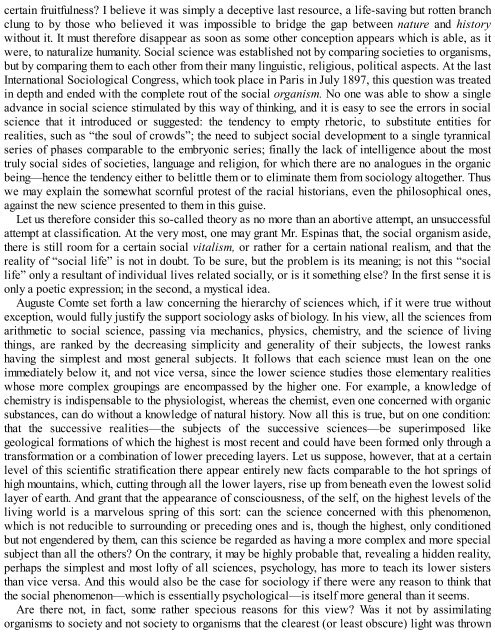3658925934
Create successful ePaper yourself
Turn your PDF publications into a flip-book with our unique Google optimized e-Paper software.
certain fruitfulness? I believe it was simply a deceptive last resource, a life-saving but rotten branch<br />
clung to by those who believed it was impossible to bridge the gap between nature and history<br />
without it. It must therefore disappear as soon as some other conception appears which is able, as it<br />
were, to naturalize humanity. Social science was established not by comparing societies to organisms,<br />
but by comparing them to each other from their many linguistic, religious, political aspects. At the last<br />
International Sociological Congress, which took place in Paris in July 1897, this question was treated<br />
in depth and ended with the complete rout of the social organism. No one was able to show a single<br />
advance in social science stimulated by this way of thinking, and it is easy to see the errors in social<br />
science that it introduced or suggested: the tendency to empty rhetoric, to substitute entities for<br />
realities, such as “the soul of crowds”; the need to subject social development to a single tyrannical<br />
series of phases comparable to the embryonic series; finally the lack of intelligence about the most<br />
truly social sides of societies, language and religion, for which there are no analogues in the organic<br />
being—hence the tendency either to belittle them or to eliminate them from sociology altogether. Thus<br />
we may explain the somewhat scornful protest of the racial historians, even the philosophical ones,<br />
against the new science presented to them in this guise.<br />
Let us therefore consider this so-called theory as no more than an abortive attempt, an unsuccessful<br />
attempt at classification. At the very most, one may grant Mr. Espinas that, the social organism aside,<br />
there is still room for a certain social vitalism, or rather for a certain national realism, and that the<br />
reality of “social life” is not in doubt. To be sure, but the problem is its meaning; is not this “social<br />
life” only a resultant of individual lives related socially, or is it something else? In the first sense it is<br />
only a poetic expression; in the second, a mystical idea.<br />
Auguste Comte set forth a law concerning the hierarchy of sciences which, if it were true without<br />
exception, would fully justify the support sociology asks of biology. In his view, all the sciences from<br />
arithmetic to social science, passing via mechanics, physics, chemistry, and the science of living<br />
things, are ranked by the decreasing simplicity and generality of their subjects, the lowest ranks<br />
having the simplest and most general subjects. It follows that each science must lean on the one<br />
immediately below it, and not vice versa, since the lower science studies those elementary realities<br />
whose more complex groupings are encompassed by the higher one. For example, a knowledge of<br />
chemistry is indispensable to the physiologist, whereas the chemist, even one concerned with organic<br />
substances, can do without a knowledge of natural history. Now all this is true, but on one condition:<br />
that the successive realities—the subjects of the successive sciences—be superimposed like<br />
geological formations of which the highest is most recent and could have been formed only through a<br />
transformation or a combination of lower preceding layers. Let us suppose, however, that at a certain<br />
level of this scientific stratification there appear entirely new facts comparable to the hot springs of<br />
high mountains, which, cutting through all the lower layers, rise up from beneath even the lowest solid<br />
layer of earth. And grant that the appearance of consciousness, of the self, on the highest levels of the<br />
living world is a marvelous spring of this sort: can the science concerned with this phenomenon,<br />
which is not reducible to surrounding or preceding ones and is, though the highest, only conditioned<br />
but not engendered by them, can this science be regarded as having a more complex and more special<br />
subject than all the others? On the contrary, it may be highly probable that, revealing a hidden reality,<br />
perhaps the simplest and most lofty of all sciences, psychology, has more to teach its lower sisters<br />
than vice versa. And this would also be the case for sociology if there were any reason to think that<br />
the social phenomenon—which is essentially psychological—is itself more general than it seems.<br />
Are there not, in fact, some rather specious reasons for this view? Was it not by assimilating<br />
organisms to society and not society to organisms that the clearest (or least obscure) light was thrown









![Genki - An Integrated Course in Elementary Japanese II [Second Edition] (2011), WITH PDF BOOKMARKS!](https://img.yumpu.com/58322134/1/180x260/genki-an-integrated-course-in-elementary-japanese-ii-second-edition-2011-with-pdf-bookmarks.jpg?quality=85)
![Genki - An Integrated Course in Elementary Japanese I [Second Edition] (2011), WITH PDF BOOKMARKS!](https://img.yumpu.com/58322120/1/182x260/genki-an-integrated-course-in-elementary-japanese-i-second-edition-2011-with-pdf-bookmarks.jpg?quality=85)





